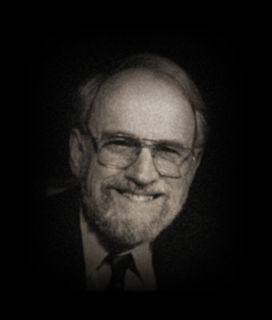A Quote by William James
The whole drift of my education goes to persuade me that the world of our present consciousness is only one out of many worlds of consciousness that exist, and that those other worlds must contain experiences which have a meaning for our life also; and that although in the main their experiences and those of this world keep discrete, yet the two become continuous at certain points, and higher energies filter in.
Related Quotes
There are only two worlds - your world, which is the real world, and other worlds, the fantasy. Worlds like this are worlds of the human imagination: their reality, or lack of reality, is not important. What is important is that they are there. these worlds provide an alternative. Provide an escape. Provide a threat. Provide a dream, and power; provide refuge, and pain. They give your world meaning. They do not exist; and thus they are all that matters.
Thanks to art, instead of seeing one world only, our own, we see that world multiply itself and we have at our disposal as many worlds as there are original artists, worlds more different one from the other than those which revolve in infinite space, worlds which, centuries after the extinction of the fire from which their light first emanated, whether it is called Rembrandt or Vermeer, send us still each one its special radiance.
I consider morals and aesthetics one and the same, for they cover only one impulse, one drive inherent in our consciousness - to bring our life and all our actions into a satisfactory relationship with the events of the world as our consciousness wants it to be, in harmony with our life and according to the laws of consciousness itself.
I believe consciousness is non-local and a big part of what we experience with near death and past lives. It's the consciousness that has come into us from other experiences and our consciousness that we remain aware of when we leave our bodies and they communicate with us through dreams, and even through drawings which I do a lot of work with myself.
Although you can find certain differences among the Buddhist philosophical schools about how the universe came into being, the basic common question addressed is how the two fundamental principles-external matter and internal mind or consciousness-although distinct, affect one another. External causes and conditions are responsible for certain of our experiences of happiness and suffering. Yet we find that it is principally our own feelings, our thoughts and our emotions, that really determine whether we are going to suffer or be happy.
And now good morrow to our waking souls, Which watch not one another out of fear; For love, all love of other sights controls, And makes one little room, an everywhere. Let sea-discoverers to new worlds have gone, Let maps to other, worlds on worlds have shown, Let us possess one world, each hath one, and is one.
It seemed clear to me that life and the world somehow depended upon me now. I may almost say that the world now seemed created for me alone: if I shot myself the world would cease to be at least for me. I say nothing of its being likely that nothing will exist for anyone when I am gone, and that as soon as my consciousness is extinguished the whole world will vanish too and become void like a phantom , as a mere appurtenance of my consciousness, for possibly all this world and all these people are only me myself.
All our thoughts and concepts are called up by sense-experiences and have a meaning only in reference to these sense-experiences. On the other hand, however, they are products of the spontaneous activity of our minds; they are thus in no wise logical consequences of the contents of these sense-experiences. If, therefore, we wish to grasp the essence of a complex of abstract notions we must for the one part investigate the mutual relationships between the concepts and the assertions made about them; for the other, we must investigate how they are related to the experiences.
To grasp life and meaning, we assume constancy where it does not exist. We name experiences, emotions, and subjective states and assume that what is named is as enduring as its name. Human beings blessed and cursed with consciousness - especially consciousness of their own being - think in terms of names, words, symbols.
The alchemists of past centuries tried hard to make the elixir of life: ... Those efforts were in vain; it is not in our power to obtain the experiences and the views of the future by prolonging our lives forward in this direction. However, it is well possible in a certain sense to prolong our lives backwards by acquiring the experiences of those who existed before us and by learning to know their views as well as if we were their contemporaries. The means for doing this is also an elixir of life.
Experiences such as, 'I went; I came; I was; I did,' come naturally to everyone. From these experiences, does it not appear that the consciousness 'I' is the subject of those various acts? Enquiry into the true nature of that consciousness, and remaining as oneself, is the way to understand, through enquiry, one's true nature.









































